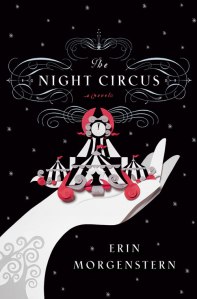 The Night Circus
The Night Circus
by Erin Morgenstern
Knopf Publishing, 2012
ISBN: 978-0307744432
528 p.p.
Review by Shaun Byron Fitzpatrick
In our post-Twilight civilization, I have learned to be very suspicious of books advertising themselves as romantic fantasy, particularly romantic fantasy seemingly aimed at a female audience. (Side note: is there any other kind? Does masculine romantic fantasy exist, or do male readers have to settle with their macho hero banging some busty damsel-in-distress the night before a big battle? I digress.) Rather than getting an exciting, well-written fantasy novel with some romance thrown in, too often these types of novels primarily revolve around a female protagonist getting sexy with a magical stud with some kind of commitment issue. (Not really my cup of tea, although I do love a good commitment issue.) So, when scanning the shelves of my local library, I picked up The Night Circus almost entirely as a way to prove my preconceived notion correct. With its black, white, and pink color scheme and its blurb promising readers a passionate romance between two young illusionists, I was all set to write a scathing review about yet another book that panders to the stereotype of the romance-obsessed woman.
Now, listen closely, because I don’t say this too often, I won’t repeat myself, and I sure as hell won’t ever admit to having written this:
I was wrong. I was terribly, wonderfully, fantastically wrong.
Erin Morgenstern’s debut novel The Night Circus may ultimately be the tale of two star-crossed magicians, but this is no magical chick-flick piece of fiction. Instead, Morgenstern’s Le Cirque des Rêves (The Circus of Dreams) is something out of a Tim Burton fan’s wet dream, a gorgeous enchantment that had me pining for my ticket from the first description of the black-and-white striped tents. The story follows Celia and Marco, two young illusionists trapped in a decades-long duel to the death to satisfy a feud between their two instructors. As the two use the circus as their battle ground, creating breathtaking attractions in order to out-maneuver the other, their work eventually becomes love letters to each other. But is their love enough to end a magical war spanning hundreds of years? (That sounds horribly cheesy, but I promise the novel makes it work.)
I’ve already admitted in past reviews that I like my fantasy novels to err on the macabre side. But this is a very fine line to walk; too much darkness will read like a bad attempt at being edgy, while too little will seem like a half-assed attempt at adding depth. Like one of her tightrope walkers, Morgenstern balances on this line beautifully, weaving her lights with her shadows in such a way that the darkness and the beauty of the novel perfectly complement each other. “The man billed as Prospero the Enchanter receives a fair amount of correspondence via the theatre office,” the novel begins, “but this is the first envelope addressed to him that contains a suicide note, and it is also the first to arrive carefully pinned to the coat of a five-year-old girl.” Morgenstern’s world hides its danger just below the surface, a shadowy figure that emerges quickly and unexpectedly before returning to its rest. Whether a young Celia is getting her fingertips slashed to teach her healing, or the contortionist Tsukiko is describing her love’s suicide by fire, readers are never allowed to grow complacent with the outward loveliness of the circus. We are explicitly told that all beauty stems from pain and suffering, leaving each breathtaking description of the circus’s tents tinged with melancholy. We know the sacrifice needed to bring these dreams to life.
It’s rare for a novel with a large cast of characters to devote itself to the development of each one; typically, we are given a few fully fleshed out characters and then a revolving door of quirky but forgettable supporting ones. Morgenstern rejects this formula, and seamlessly ties the lives of her characters together in such a way that the novel moves from one perspective to another without any abruptness or awkward chapter breaks (I’m looking at you, Game of Thrones). There are no unimportant characters in The Night Circus, and Morgenstern gives each the attention they deserve. If pressed to pick a favorite, I find myself unable to decide between the mysterious Tsukiko and the clockmaker Friedrick, fully aware that if I think too much about it I will be forced to include at least three more characters into the running. This is the mark of a great storyteller: the ability to create characters so compelling that choosing a favorite seems like a slight to all the others.
Ever since I was a kid, I’ve been a series-person. I like to follow characters from one adventure to another, spanning novel after novel. I get invested in an imaginary world and can’t bear to let my ink-bound friends go on without me. But, every once in a while, I find a novel that is so perfectly self-contained, so satisfying, that I don’t need book after book. As I closed The Night Circus, I was actually sad that I had finished this adventure. But I didn’t long for a sequel, or ache to find out what happened to Poppet or Marco or any of the other characters I had come to care for. This isn’t a weakness of the novel, but rather so rare a strength that I can name only a handful of other titles that have had the same effect on me. There was nothing left for The Night Circus to give me; I was totally and completely satisfied. I wasn’t wrenched out of the plot, thrown unceremoniously back into the real world while still longing for answers. I left happily, parted with it as old friends who know that the other will be just fine in the end.
I am no rêveur; I will not be following this circus. It was enough for me to have had the pleasure of experiencing it, and I only hope that others secure their own tickets to The Night Circus.
***
 Erin Morgenstern is “a Cancerian with a Leo Moon and Taurus rising” who grew up in Massachusetts. She is a writer and an artist who incorporates fairy tales into both of these projects. Like her fortune teller in The Night Circus, she has hand-painted a deck of black and white tarot cards. This is her first novel.
Erin Morgenstern is “a Cancerian with a Leo Moon and Taurus rising” who grew up in Massachusetts. She is a writer and an artist who incorporates fairy tales into both of these projects. Like her fortune teller in The Night Circus, she has hand-painted a deck of black and white tarot cards. This is her first novel.
